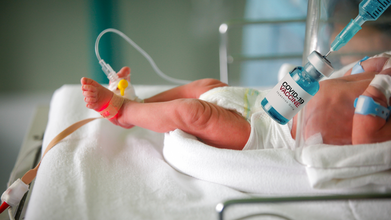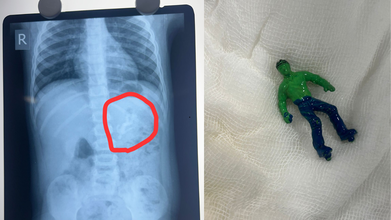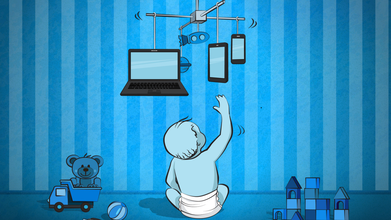- Health Conditions A-Z
- Health & Wellness
- Nutrition
- Fitness
- Health News
- Ayurveda
- Videos
- Medicine A-Z
- Parenting
When Do Babies Say 'Mama' And 'Dada'? Tips To Help Them Say Their First Words

Image Credit: Canva
Hearing a baby's first words is a magical milestone for every parent. The journey to these words, however, is filled with babbling, cooing, and endless anticipation. While each child is unique, there are fascinating insights into when and how babies start saying "Mama" and "Dada." Here's an in-depth look at this heartwarming stage of development, with expert advice to help parents support their little ones on this linguistic journey.
Babies develop at their own pace, reaching milestones on unique timelines. That said, most babies start experimenting with sounds around seven months of age. These early sounds often include repetitive syllables such as "mamamama" and "dadadada." At this stage, these are more babbling experiments than intentional words.
By nine months, many babies start babbling "Mama" or "Dada" on purpose, even if they don't really understand what those words mean. For instance, your little one might say "Mama" while looking at you-or even at the family pet or a favorite toy!
It is usually around the one-year mark that babies start using "Mama" or "Dada" correctly in context and use each parent's name specifically. This is an important milestone in their language development and social connection.
Why Are "Mama" and "Dada" Often the First Words?
Several factors make "Mama" and "Dada" prime candidates for a baby's first words:
1. Frequency of Use
Babies tend to repeat the words they are most exposed to. As a result, parents repeat these words in interaction with their child, and therefore become some of the first sounds a baby attempts to repeat.
2. Phonetics: Easy to pronounce
The "m" and "d" sounds are the easiest sounds for babies to pronounce. Since "Mama" and "Dada" are two syllables with the same sounds, it's easy for the little one just learning how to control the vocal cords to repeat.
3. Emotional Connection
Babies are instinctively attracted to words that elicit strong emotional reactions. The enthusiastic response of the parents to "Mama" and "Dada" motivates the babies to repeat the words, thus reinforcing the association.
Who Wins the First Word Race: Mama or Dada?
The debate over whether a baby says "Mama" or "Dada" first is a playful debate in many households. Research indicates that "Dada" is often said first, mainly because the "d" sound is easier for babies to pronounce than the "m" sound.
However, this is not a rule that is always set in stone. Sometimes, babies prefer "Mama" more, especially when they spend more time with mom or find the "m" sound easier to reproduce. More importantly, this order of the first words uttered does not signify a baby's preference for one parent over the other; it is just a matter of phonetic ease and exposure.
Tips to Encourage Your Baby to Say Mama and Dada
While your baby will speak on their own schedule, there are gentle ways to encourage their linguistic development:
1. Repeat and Reinforce: Frequently say "Mama" and "Dada" while pointing to yourself or your partner. Repetition helps babies associate the sounds with specific people.
2. Tactual Method Hold the baby's hand against your mouth and say "Mama" or "Dada." The feedback by touching can also facilitate understanding how the sounds are formed.
3. Photobook: Create a Simple Photo Album with pictures of "Mama" and "Dada." Sit next to your baby, show the picture one at a time, and say the names out loud. Ask such questions as, "Who is this?".
4. Read to Your Baby: Use books with simple, repetitive language that contains "Mama" and "Dada." Reading not only is beneficial for language development, but it also helps cement the bond between parent and child.
5. Respond to Babbling: Interact with your baby whenever they babble by matching sounds and encouraging dialogue. Positive reinforcement of their attempts at communicating encourages them to continue the effort.
What if your Baby isn't Saying Mama or Dada?
While it's normal to be concerned if your baby hasn't achieved this milestone, remember that every child develops differently. However, if your baby hasn't started saying any words by 12 to 15 months, it is a good idea to see a pediatrician. They might check for hearing or speech issues and provide guidance tailored to your child's needs.
Are Boys More Likely to Say Mama or Dada First?
Interestingly, there is no scientific evidence to indicate that boys or girls are more likely to say "Mama" or "Dada" first. The timing and choice of first words depend entirely on the individual baby and their unique experiences, not their gender.
Tips for Building Language Skills in Babies
Once your baby masters “Mama” and “Dada,” they’ll soon begin adding new words to their vocabulary. Support this growth by:
- Naming Objects: Consistently name objects during play or daily routines to help your baby associate words with their meanings.
- Encouraging Imitation: Use simple sentences and encourage your baby to repeat them.
- Celebrate milestones: Cheer enthusiastically when your baby learns a new word, as positive reinforcement strengthens their motivation.
Hearing your baby say “Mama” or “Dada” for the first time is a moment you’ll treasure forever. While waiting for this milestone can be a test of patience, the journey is just as rewarding as the destination. By engaging with your baby, encouraging communication, and celebrating their efforts, you’re laying the foundation for a lifetime of meaningful conversations.
The first word of every baby is a testimony to the child's growth and the love and support he or she gets from the parents. Therefore, whether it is "Mama" or "Dada," your baby will surely become a confident little communicator in no time.
Important Milestones: Your Child By One Year. CDC
Language Development: 8 to 12 Months. American Academy of Pediatrics.
COVID Vaccination Is Not Linked To Reduce In Childbirth, Says Study

Credits: iStock and Canva
A large population-based study from Linköping University in Sweden has found no evidence that COVID-19 vaccination caused a decline in childbirth during the pandemic, countering persistent rumors that mRNA vaccines affect fertility. The findings have been published in the peer-reviewed journal Communications Medicine.
The study was conducted amid widespread misinformation, particularly on social media, suggesting that COVID-19 vaccines reduce the chances of becoming pregnant. These claims gained traction as several countries, including Sweden, recorded a drop in birth rates during the later stages of the pandemic, prompting questions about a possible link to vaccination.
“Our conclusion is that it’s highly unlikely that the mRNA vaccine against COVID-19 was behind the decrease in childbirth during the pandemic,” said Toomas Timpka, professor of social medicine at Linköping University and one of the study’s authors.
Why Researchers Investigated the Claim
Since the early months of the pandemic, unverified claims about vaccines and fertility have circulated widely online. When official data later showed fewer babies being born in some regions, researchers decided to examine whether vaccination could plausibly explain the trend or whether other social and demographic factors were at play.
Read: Ahmedabad Toddler Swallows Hulk Toy, Showed X-Ray, Doctors Remove It Via Endoscopy
To address the issue, the research team carried out an extensive analysis using real-world healthcare data rather than surveys or self-reported outcomes.
Study Looks at Nearly 60,000 Women
The study analyzed health records of all women aged 18 to 45 years living in Region Jönköping County, a region with a total population of around 369,000 people. This amounted to nearly 60,000 women included in the analysis.
Between 2021 and 2024, about 75 per cent of these women received at least one dose of a COVID-19 vaccine. Researchers examined data on childbirths, registered miscarriages, vaccination status and deaths using official healthcare records, allowing for a comprehensive comparison between vaccinated and unvaccinated groups.
Importantly, the researchers adjusted their analysis for age, recognizing that age is one of the most significant factors influencing fertility and pregnancy outcomes.
No Difference in Births or Miscarriages
When childbirth rates were compared between vaccinated and unvaccinated women, the researchers found no statistically significant difference. The same held true for miscarriage rates among women who became pregnant during the study period.
“We see no difference in childbirth rates between those who have taken the vaccine and those who haven’t,” said Timpka. “We’ve also looked at all registered miscarriages among those who became pregnant, and we see no difference between the groups there either.”
These findings align with several earlier international studies that have similarly found no association between COVID-19 vaccination and reduced fertility.
Other Factors Likely Behind Falling Birth Rates
According to the researchers, the decline in childbirth observed during the pandemic is more plausibly explained by broader demographic and social trends.
People currently in their 30s, the age group most likely to have children, were born in the second half of the 1990s. That period was marked by economic challenges and lower birth rates in Sweden, meaning today’s pool of potential parents is smaller than in previous generations.
In addition, pandemic-related factors such as health concerns, economic uncertainty, delayed family planning and lifestyle changes during lockdowns may have contributed to fewer pregnancies.
One of the study’s key strengths is its large, representative sample drawn from an entire region rather than a selected group. By using verified healthcare records and accounting for age-related effects, the researchers aimed to minimize bias and improve reliability.
The study received financial support from several sources, including the Swedish Research Council.
Ahmedabad Toddler Swallows Hulk Toy, Showed X-Ray, Doctors Remove It Via Endoscopy

Credits: X
Ahmedabad toddler, one-and-a-half-year-old boy swallowed a 'Hulk' toy, which is based on a popular comic superhero. The toy was stuck in his stomach when his parents took him to the Civil Hospital. According to reports by News18, the child is identified as Vansh who showed the signs of discomfort and began vomiting. This is what alarmed the parents.
As per the News18 report, his mother Bhavika was suspicious when she noticed that one of his toys was missing. The child was rushed to the hospital and an X-ray revealed that he had swallowed the entire plastic toy. The toy was not broken.
Hindustan Times reported that Dr Rakesh Joshi, Head of the Department of Pediatric Surgery removed the toy through upper GI endoscopy. "Had it been a little late, the toy could have moved further from the stomach and got stuck in the intestines. In that case, there would have been a risk of intestinal blockage and even rupture," the senior doctor said.
"There is a natural valve between the esophagus and the stomach. The biggest challenge was to take out a whole toy through this valve. When we tried to grab it with the endoscope, the toy kept slipping because of the air in the stomach. Pulling the toy by its hand or foot raised the possibility of it getting stuck in the valve and causing it permanent damage," he said.
The doctor noted that if the toy had further slipped down, it would have increased the risk of intestine rupturing.
Ahmedabad Toddler Swallows Hulk Toy: What Parents Must Keep In Their Mind
Under the Toys (Quality Control) Order, 2020 issued by the Department for Promotion of Industry and Internal Trade under the Ministry of Commerce and Industry, toy safety in India was brought under mandatory BIS certification from September 1, 2020. The move aims to ensure safer toys for children while also supporting the government’s policy of curbing non-essential imports.
Industry sources estimate that more than 85 percent of toys sold in India are imported. Officials say the Toys Quality Control Order is a key step in preventing the entry of cheap and substandard toys into the domestic market, many of which fail to meet basic safety requirements.
Ahmedabad Toddler Swallows Hulk Toy: Standards for Electric and Non-Electric Toys
The quality control order clearly defines safety standards based on the type of toy. Non-electric toys such as dolls, rattles, puzzles, and board games must comply with IS 9873 (Part 1):2019. These toys do not rely on electricity for any of their functions.
Electric toys, which include at least one function powered by electricity, are required to meet the standards outlined under IS 15644:2006. Compliance with these standards is mandatory before such toys can be sold in the Indian market.
Ahmedabad Toddler Swallows Hulk Toy: Risks Linked to Untested Toys
Toys that are not tested by NABL-accredited toy testing laboratories can pose serious health risks to children. Sharp edges and poorly finished parts can cause cuts and injuries. PVC toys may contain phthalates, which are considered harmful chemicals.
Many low-quality toys have also been found to contain lead, a substance known to be particularly damaging to brain development in children. Soft toys with fur or hair can trigger allergies or become choking hazards. In some cases, small body parts can get stuck in gaps or holes, increasing the risk of injury.
Testing by NABL-accredited laboratories ensures that toys are safe, durable, and suitable for specific age groups. Parents are advised to check for IS marks on toys before purchasing, as this indicates compliance with Indian safety standards.
Ahmedabad Toddler Swallows Hulk Toy: What Parents Should Check Before Buying Toys
Experts recommend avoiding toys with small detachable parts for toddlers and young children, as they are more likely to put objects in their mouths. Toys should always match the child’s age, skill level, and interests.
Parents are also urged to look for IS marks, which confirm that the toy has been tested and certified. Loud toys should be avoided, as prolonged exposure to sounds above 85 decibels can harm a child’s hearing.
Electric toys with heating elements should be used with caution or avoided altogether due to burn risks. Finally, toys with sharp edges or shooting components should be carefully examined to prevent cuts and injuries.
Tech And Devices Have 'Horrific' Impact On Kids, Says Study

Credits: iStock
Doctors across the UK are raising the alarm over what they describe as mounting evidence of serious health harms linked to excessive screen time and unrestricted access to digital content among children and young people.
The Academy of Medical Royal Colleges (AoMRC), which represents 23 medical royal colleges and faculties, says frontline clinicians are witnessing deeply concerning patterns across the NHS. According to the academy, doctors working in primary care, hospitals and community settings have shared firsthand accounts of what they describe as “horrific cases” affecting both physical and mental health.
Evidence From the Frontline
The academy has now launched a formal evidence-gathering exercise to better understand the harms clinicians are repeatedly encountering and whether these can be attributed to technology use and digital devices.
Its aim is twofold. First, to shine a light on risks that often go unnoticed, including prolonged screen time and exposure to harmful online content. Second, to develop guidance for healthcare professionals on how to identify, address and manage these issues in clinical practice.
In a statement, the AoMRC said it already has evidence pointing to significant impacts on children’s wellbeing, ranging from physical concerns to mental health challenges linked to both excessive device use and harmful online material. The work is expected to be completed within three months.
A Public Health Emergency?
Dr Jeanette Dickson, chair of the academy, said the scale of the problem is becoming impossible to ignore. Speaking to The Sunday Times, she warned that clinicians may be witnessing the early stages of a public health emergency.
“Everywhere we look, we see children and adults glued to their screens,” she said. “I really worry for children, some of whom are self-evidently imprisoned in a digital bubble.”
Copies of the academy’s letter outlining these concerns have been sent to Health Secretary Wes Streeting and Science and Technology Secretary Liz Kendall, as well as Lucy Chappell, chief executive of the National Institute for Health Research, and the government’s chief medical adviser, Sir Chris Whitty.
Government Action and Global Trends
The warnings come as the UK government prepares to consult on possible restrictions on social media use for under-16s. Options under consideration range from a complete ban to more targeted measures such as time limits and tighter controls on algorithms.
Recent government research has already linked screen time to poorer speech development in children under five. Internationally, the debate is gaining pace. Australia introduced a ban on under-16s holding social media accounts in December, while countries including France, Denmark, Norway and Malaysia are weighing similar steps.
Why Some Groups Oppose a Blanket Ban
Not everyone agrees that an outright ban is the answer. A joint statement signed by 43 child protection charities and online safety groups, including the NSPCC and the Molly Rose Foundation, warns that blanket bans could backfire.
Andy Burrows, chief executive of the Molly Rose Foundation, said parents and policymakers are being offered a false choice. “It’s being framed as either a total ban or the current appalling status quo,” he said. “Those aren’t the only options.”
Chris Sherwood, chief executive of the NSPCC, echoed the concern, pointing out that for many children, the internet provides vital support. “A blanket ban would take those spaces away overnight,” he said, “and risks pushing teenagers into darker, unregulated corners of the internet.”
Both organizations argue that the focus should shift to holding tech companies accountable for harmful design choices, unsafe algorithms and failures to protect young users.
© 2024 Bennett, Coleman & Company Limited

